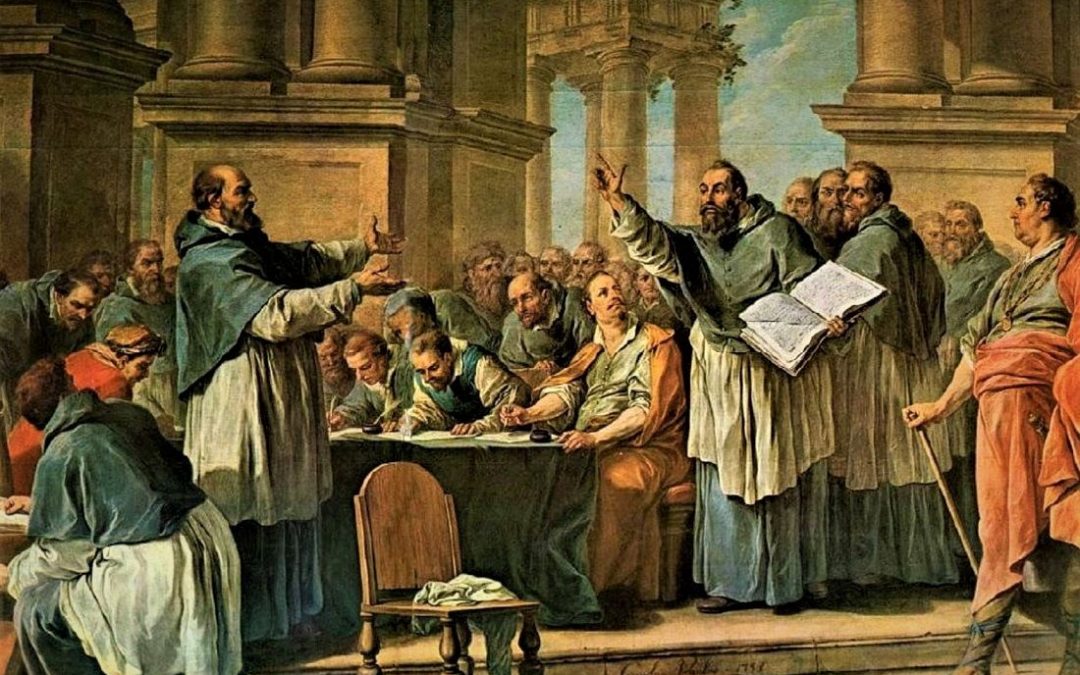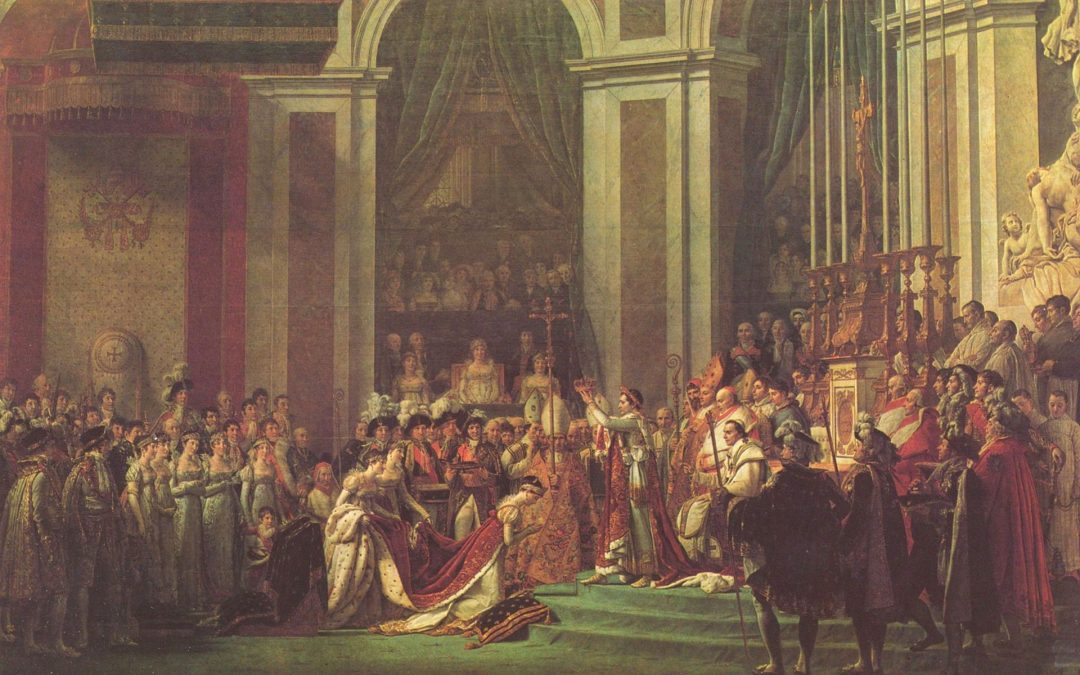That those who hold to classical theism and the originalist intent of the Reformed confessions have embraced the antonym of sola Scriptura is not only baseless, but it also appears to be what might be aptly called a red herring.
What is a “red herring”?
A “red herring” is a distracting argument, retort, or allegation intended to take attention away from the relevant issues. The most relevant “red herring,” for our purposes, is the allegation that those brothers imbibing classical theism have begun to compromise on the doctrine of sola Scriptura. Expressing his concern in a recent article, Dr. Sam Waldron writes, “With such clear and crucial scriptural truth and confessional affirmation before us, it is nothing less than shocking to be confronted in recent years with assertions by Reformed men that (seem to me) directly undermine the truth of the supremacy and sufficiency of sola scriptura.”
Waldron offers what we might call circumstantial “proof” for this alleged slippery slope. That is to say, no one currently on the front lines propagating classical theism has directly called into question the doctrine of sola Scriptura. And, for what it’s worth, those same individuals are currently trying to prevent the drastic revision of Reformation and post-Reformation doctrine.
The doctrinal landscape doesn’t look too good. On the one hand, Waldron and others are criticizing confessional Reformed Baptists for neglecting sola Scriptura, a reformational doctrine no doubt. On the other hand, these same confessional Reformed Baptists (currently under the gun) are actively promoting and defending reformational doctrines, beginning with the doctrine of God—the causal foundation of sola Scriptura in the first place!
As Bertrand Russel would say in his debate with Frederick Copleston, “We are at an impasse!”
Two arms of Reformedom—classical trinitarianism and sola Scriptura—are at apparent odds with one another. But how is this so? Either the side alleging compromise regarding sola Scriptura has gotten its definition wrong, or every framer of every Reformed confession of the 17th century had no idea what sola Scriptura meant. I would imagine the former would be off-limits to interlocutors like Waldron, leaving only the latter. But is it really the case that the confessional framers were wrong about sola Scriptura? It’s possible. But are we even equipped to make that kind of a judgment call? And how egotistically bloated are we if we bow out our chest, thump it a few times while saying, “Of course we are!” Our friends don’t appear to go there, not presently at least. Although, increasingly I think they’re becoming flirtatious with that idea (cf. words on Waldron’s closing toward the end of this article).
Given what I’ve expressed above, I will make the assumption throughout this article that we all agree with the confessional doctrine of Scripture as stated in places like the Second London Confession (1677/89), 1.1.
Why I am Concerned
After asserting his alignment with the confessional doctrine of Scripture, Waldron begins giving reasons for his “concerns” in the form of five un-sourced statements. Why they are un-sourced, I’m not entirely sure. One would think if the subject-matter were so “concerning,” the vulnerable would need to know what to look out for and from which direction it may be coming. Instead, Waldron offers five statements of what amounts to hearsay. Thankfully, for the readers of this article, some friends of mine have gathered citations for two of the statements. I will include those citations when I come to them.
First Troubling Statement
The first statement says, “Semper Reformanda … does not mean changing doctrine, but it means applying the doctrine to our lives. It is a clarion call to a vital experiential understanding of the truth in the lives of Christ’s sheep. So it’s not changing our doctrine, but applying the doctrine that we already know to be biblical.” Waldron is quick to call foul, writing, “it seems to me, whatever semper reformanda originally meant, we must embrace the notion that our confessions are subject to being reformed on the basis of sola scriptura.” One has to wonder, however: If we were to engage in revising our confessions, would it truly be on the basis of Scripture, or would it be on the basis of our interpretation of Scripture?
I’m not sure about you, but I live over three-hundred years into Enlightenment history. I have picked up bad habits from the teachers of my culture, my society, my educational system, and even my own parents (and they from theirs, and so on). It’s a perennial, generational issue because since at least the 17th century, the culture has been soaked in a thousand different idealisms all vying for first place.
We are, to some degree, an intellectual product of the circumstances in which we live. Thankfully, in order to transcend our immediate milieu, we have things like formal logic useful for analysis of the present, but we also have history, in which we explore the what and the why of yesteryear. Maybe earlier ages had lesser intellectual and societal baggage than we do. Scripture itself testifies to the wisdom of looking back to older generations when it says, “Do not remove the ancient landmark Which your fathers have set” (Prov. 22:28). YHWH, in Jeremiah 6:16, says, “Ask for the old paths, where the good way is, And walk in it.”
It would be naive, if not arrogant (or both), to suggest we have the individualistic wherewithal to approach revision of the confessions when we ourselves, as Particular Baptists, have barely scratched the surface in our understanding of the background behind the confessional language in the first place. The current debate demonstrates this to be the case. Therefore, we ought to beware, lest we, rather than Scripture, are the ones doing the revising.
Second Troubling Statement
The second statement is from an article posted on The London Lyceum in review of Jeffrey Johnson’s recent book, The Failure of Natural Theology. It reads—
2LCF 1.1 confesses the following: “The Holy Scripture is the only sufficient, certain, and infallible rule of all saving knowledge, faith, and obedience…” Notice what Scripture is sufficient for. Is it everything? No. It is not sufficient for changing the oil on my truck. It is not sufficient for installing a new hard drive in my computer. It is sufficient for saving knowledge, faith, and obedience. Everything necessary for the Christian life is found in the Bible. But not every detail of the faith is there.
For Waldron, this statement appears mostly correct, except for the last line, “But not every detail of the faith is there.” Waldron rebuts with the confessional language which, in context, reads, “The Holy Scripture is the only sufficient, certain, and infallible rule of all saving knowledge, faith, and obedience…” But Waldron actually changes the sense of this statement by summarizing it as, “Scripture is the only rule for faith.” This is not what the Confession says.
The Confession states that the Scripture is the only sufficient, certain, and infallible rule of all saving knowledge, faith, and obedience…” Scripture is the only sufficient rule for faith, but it is not the only informant of our faith, which is what the guys over at The London Lyceum seem to mean. Jordan Steffaniak, the author of the statement in question, goes on to write, “This does not mean we need things outside of Scripture for ‘saving knowledge, faith, and obedience…’ But if we want to both know and enjoy God to the maximum degree, we ought to utilize all the means God has given us in his good creation.”
Certainly the heavens informed David’s faith, “The heavens declare the glory of God; And the firmament shows His handiwork” (Ps. 19:1). And Paul explicitly tells us that God has given us (both unbelievers and believers) a witness through providence, “in that He did good, gave us rain from heaven and fruitful seasons, filling our hearts with food and gladness” (Acts 14:17). These texts assume a circumstance that preceded the texts themselves, namely, the witness of God through nature accessible to all men. The book of Scripture does not change, add, or annul, but assumes, that which may be gleaned through the book of nature. Thus, there doesn’t appear to be legitimate concern here. And, there is no departure from the confessional doctrine of Scripture.
Third Troubling Statement
The third statement is from Matthew Barrett’s recent book, Simply Trinity, pp. 65-66. Bear in mind that Barrett clearly says things like, “the Nicene Creed is not a dead letter; rather, it carries authority to this day. No, it is not on par with Scripture; it is not a source of divine revelation (p. 65).” Yet, this is never mentioned in Waldron’s representation. What Waldron does quote is partly from the book-proper, but mostly from a side-note on the synchronic definition of the term heresy (how it has been understood in its classical setting). The whole of the quote reads—
To depart from the creed is to depart from scriptural teaching itself. … Heresy is a belief that contradicts, denies, or undermines a doctrine that an ecumenical church council has declared biblical and essential to Christianity. What makes heresy so subtle and dangerous? It is nurtured within the church and is wrapped within Christian vocabulary. Its representatives even quote the Bible. It often presents itself as the whole truth when it is a half-truth.
Why Waldron selected these two parts to go together in his representation of Barrett’s words is a mystery. He certainly did not represent the author well. Barrett clearly says, “since [the Nicene Creed] conforms to Scripture, it is to be adhered to, confessed, and celebrated in the church to this day. To depart from the creed is to depart from scriptural teaching itself.”
In other words, Barrett is clearly setting forth what everyone ought to agree with. When someone or something speaks the Word of God clearly and accurately, it also does so authoritatively (to the extent it gets it right). If the Nicene Creed is in line with the biblical data, then it carries authority. It is, to use the older language, not the norming norm (Scripture), but the normed norm. The creeds are designed to norm us, though they themselves are normed by a higher standard, the Scripture. So, again, there is nothing of concern here. There is nothing that suggests a departure from an orthodox understanding of Scripture.
Fourth Troubling Statement
The fourth statement comes from a friend of Waldron’s after having a conversation with some fellow Reformed brethren. I am going to refrain from commenting on this particular statement since it is said to have come from what appears to have been a private conversation. I do not want to speculate on meaning, intention, etc.
Fifth Troubling Statement
Waldron summarizes this last statement as, “Thomas Aquinas held to sola Scriptura.” Since this article comes with virtually no source material cited, I cannot determine whether this is something truly being stated and seriously defended. But suffice it to say this concern of Waldron’s illustrates the difficulty of summarizing an entire doctrine of Scripture with the moniker sola Scriptura.
Sola Scriptura is a statement designed to affirm the preeminence of Scripture’s authority over other authorities, because it comes from God, “The authority of the Holy Scripture, for which it ought to be believed, dependeth not upon the testimony of any man or church, but wholly upon God (who is truth itself), the author thereof; therefore it is to be received because it is the Word of God” (2LBCF, 1.4).
If this is all we mean by sola Scriptura, then Thomas Aquinas believed sola Scriptura. If, however, we mean more than the above statement on primary authority, then, well, Thomas most likely did not believe in sola Scriptura. For example, in the Summa Theologiae, he makes this statement about unwritten apostolic teaching—
The Apostles, led by the inward instinct of the Holy Spirit, handed down to the churches certain instructions which they did not put in writing, but which have been ordained, in accordance with the observance of the Church as practiced by the faithful as time went on. Wherefore the Apostle says (2 Thess 2:14): Stand fast; and hold the traditions which you have learned, whether by word—that is by word of mouth—or by our epistle—that is by word put into writing. Among these traditions is the worship of Christ’s image. Wherefore it is said that Blessed Luke painted the image of Christ, which is in Rome (ST, III. Q. 25, A. 3).
Would we disagree with this? Of course. In our estimation, oral tradition is neither a parallel nor a coequal source of authority alongside Scripture. To be fair, however, a parallel source of divinely inspired, but unwritten, instruction did not feature in Thomas’ work to the extent one might expect. Nevertheless, no one wants to argue Thomas held to sola Scriptura in the broadest sense of that term. But did he believe Scripture was the chief authority and source of the chief science (sacred theology)? Yes he did. Furthermore, in other places, he appears to make the “doctors of the church” subordinate to Scripture, “Nevertheless, sacred doctrine makes use of these authorities as extrinsic and probable arguments; but properly uses the authority of the canonical Scriptures as an incontrovertible proof, and the authority of the doctors of the Church as one that may properly be used, yet merely as probable” (ST, Q. 1, A. 8, C. 3).
Waldron further complains that in his Commentary on the Gospel of John, Thomas says, “The reason is that only canonical Scripture is a measure of faith.” This is certainly not a statement implying some belief in sola Scriptura, Waldron retorts. He writes, “First, the contrast Thomas is drawing in context is between canonical Scripture and non-canonical writings. He is not contrasting Scripture with the oral traditions of the church.” In the actual context, there is nothing necessitating this observation. It appears to be conjecture. He further says, “Second, he does not say that the canonical Scripture is the measure of faith, but ‘a measure of faith.’ The author of the article on this site makes this point clearly.” Since Thomas, Waldron thinks, does not say “the measure of faith,” but, “a measure of faith,” he cannot possibly hold to sola Scriptura.
However, we have to remember something: Thomas wrote in Latin. In Latin, there are no articles, e.g. “the” or “a.” Articles have to be added into the English translation. In fact, my translation has Thomas writing, “The reason for this is that only the canonical Scriptures are the standard of faith.”
One Last Issue
Waldron converses at length in an effort to repel allegations of biblicism apparently launched in his direction. I will not cover this conversation here. What I would like to do at this point is look at his closing words. He ends his article by asking the question, “Did the Development of Doctrine Cease in the 17th Century?” In this section, he affirms his love for the high Reformed and Puritan theologians of the 17th century, and then adds—
But I cannot accept the view that the development of doctrine ceased in the 17th century. This really seems to be the perspective of some. The New Testament teaches that the organic development of Christ’s church continues throughout this age and only ceases when the church is finally built and Christ returns. This infers the development of doctrine throughout this age.
Jude 3 says, “Beloved, while I was very diligent to write to you concerning our common salvation, I found it necessary to write to you exhorting you to contend earnestly for the faith which was once for all delivered to the saints.” Doctrine itself does not develop. It is what it is, as God revealed it. Is there work that goes into properly understanding this doctrine? Yes. This is why we should make a distinction between doctrine in itself (in se) as an object of human knowledge, and doctrine as it exists—to a greater or lesser degree—in the mind of the knowing subject (in subiecto). Does our understanding grow over the years? Yes, it most certainly does—and I think this is what Waldron is getting at.
However, we must keep in view what that means. This is our understanding. Are we ready to assert our understanding over and against those who have gone before us? To answer this question, we have to take a humble posture and ask, “Are we even equipped to take up such a task?” The answer would unequivocally be, “No!” We have not properly understood the doctrine of the confessions up to this point in a way that would allow us to fruitfully disagree with them. Less than 30 years ago, the majority of American Christians were Arminians, and they didn’t even know it. We are seriously behind!
Further, we most certainly have not even begun to grasp the hermeneutical methodology that led to the framers’ dogmatic reflections. Once we can confidently say we’ve penciled all this through, we can assert our objections and make revisions. My suspicion, however, is that we are nowhere near capable of performing this task with any shred of humility or skill.
In the 17th century, Cartesian rationalism dawned. In the 18th century, idealism dawned in the face of skepticism. In the 19th century, fideism and biblicism served as the reactionary fruit of the first two centuries. The 20th century gave us the industrial revolution, the sexual revolution, an expansion of the governmental educational system—the likes of which the world has never seen—and the rapid influence of feminism. Not only this, but from the 19th century onward, concomitant with fideism as its opposite, higher criticism took textual interpretation by storm. Nicene (partitive) exegesis was largely lost, the sensus plenoir entirely disrupted, and we can go ahead and forget about the anologia fide. We are dealing with a plethora of influences, each competing for maximal pressure in terms of our understanding of life’s greatest questions.
How can we seriously look back to our forefathers, who did not have (by the way) this same intellectual baggage, and presume to revise their work? We are not ready, beloved! Waldron cites the developments in eschatology since the 17th century. Supposedly, we have made strides since then. I do not believe this is the case. There is more divisiveness and confusion concerning eschatology than there ever was in the pre-modern and early modern eras. Eschatology, in fact, appeared much more cogent, generally, in the first five centuries of the church’s history than it does now.
Waldron ends by saying, “We must not assume the perfection and finality of the High Reformed construction of doctrine. They did not assume it. We should not either. All of our development of doctrine is subject to the lord and master, sola scriptura!” Ironically, however, Waldron would have to assume his own finality or primacy if he were to revise the confessional dogmas, and that goes for anyone who would enter upon that humbling task. Likewise, to cut the creeds and confessions from any definition of orthodoxy turns orthodoxy into nothing more than a was nose. Every man, it seems, gets to define both orthodoxy and heresy without any reference to guiding traditionary influences. But this does nothing more than transfer the powers of the magisterium from the Vatican to the study desk. Universal popery and individual popery function on the same fundamental principles. Thankfully, a confessional understanding and placement of tradition helps us to avoid either of these extremes.
Whatever happened to our humble admission that the men who went before us knew better than us? Why do we now turn a suspicious eye toward our forefathers? Have we really become skeptics? Confessional agnostics? Is that how we read our fathers in the faith, with skepticism rather than optimistic trust in Christ—that He indeed was building His church then as He is now? And should we not work within that apparatus instead of doubting everything that precedes us?
I will end with a quote by Matthew Barrett, who eloquently summarizes the issue here and provides a succinct solution: “Our default instinct should not be a hermeneutic of suspicion but a hermeneutic of trust, one that breeds humility, an eagerness to sit as a pupil at the feet of orthodoxy rather than stand over it as its lord” (Simply Trinity, p. 66).






